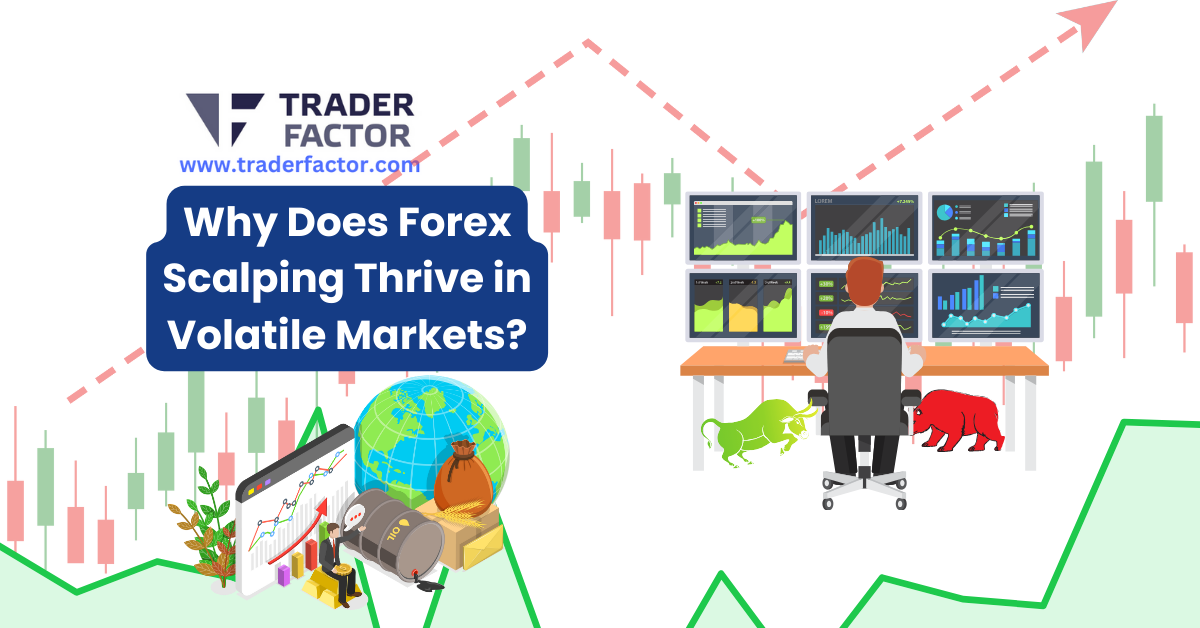Imagine you’re a forex trader during the 2008 financial crisis, an era of extreme volatility. You’d notice something intriguing: amidst the chaos and uncertainty, forex scalping – the practice of making numerous trades within short periods to profit from minor price changes – seemed to flourish.
Why is that? Why does this specific strategy thrive in turbulent conditions?
The answer, as you’ll find out, lies in the very nature of volatility and the unique opportunities it provides for shrewd, quick-acting traders.
Table of Contents
ToggleKey Takeaways
- Forex scalping is a trading strategy that aims to make small profits by exploiting minute price changes in volatile markets.
- Conducting thorough market volatility analysis is essential for successful scalping, involving studying past market behaviors, identifying price patterns, and predicting future price movements.
- Balancing risk and reward is crucial in forex scalping, and risk management techniques and reward optimization tactics should be used to justify and balance the two.
- There are various scalping strategies that can be effective in navigating unstable market conditions, such as leveraging scalping indicators, algorithmic trading, breakout scalping, and news trading.

Understanding Forex Scalping
To truly grasp forex scalping, you’ve got to know it’s a trading strategy where traders aim to make small profits by exploiting the market’s minute price changes. It’s a high-speed game, requiring quick decision-making and even quicker executions.
Scalping psychology is crucial in this rapid-fire approach. You must maintain a cool head, be decisive, and stick to your trading plan. Emotional reactions can lead to costly mistakes. You’ve got to stay focused, not getting too high with wins or too low with losses. Remember, success in scalping hinges on making more profitable trades than losing ones over time.
Scalping regulations vary by broker and country. Some brokers allow it, while others restrict or even ban the practice due to its potential to manipulate the market. It’s your responsibility to understand the rules of the game before jumping in.
Forex scalping isn’t for everyone. It’s a high-pressure, high-risk strategy best suited to traders who thrive on adrenaline and have the time to devote to the markets. But if you’ve got the right mindset and understand the rules, it can be a profitable way to navigate the forex market’s volatility.

Attractiveness of Volatile Markets
While understanding forex scalping is key, it’s equally important to appreciate why volatile markets can be so attractive for this strategy. You might wonder what makes them so enticing? Well, the answer lies in the volatile market benefits.
In volatile markets, prices fluctuate rapidly within short periods, creating numerous trading opportunities. Here, the speed and frequency of price changes mean you can make multiple trades in one day, potentially generating higher profits. It’s like a goldmine for scalpers who thrive on these quick shifts.
But remember, it’s not just about jumping in. You need to conduct a thorough market volatility analysis. This involves studying past market behaviors, identifying price patterns, and predicting future price movements. Yes, it can be complex, but it’s crucial. It equips you with the knowledge you need to make informed decisions, helping you to minimize risks while maximizing gains.

Risk and Reward Balance
Balancing risk and reward in forex scalping, especially in volatile markets, is a critical aspect of your strategy that you can’t afford to overlook. It’s about ensuring that your potential gains justify the risk you’re taking. This balance is achieved through a combination of Risk Management Techniques and Reward Optimization Tactics.
Risk Management Techniques are all about limiting your exposure. This could involve setting stop losses, diversifying your trades or employing hedging strategies. On the other hand, Reward Optimization Tactics aim to maximize your potential gains. This might include setting take profit levels, using limit orders, or capitalizing on market trends.
Let’s break it down in a simple table:
| Risk Management Techniques | Reward Optimization Tactics |
| Setting stop losses | Setting take profit levels |
| Diversifying trades | Using limit orders |
| Employing hedging strategies | Capitalizing on market trends |

Scalping Strategies in Unstable Conditions
Having established the importance of risk management and reward optimization, let’s now explore specific scalping strategies you can employ in unstable market conditions.
- Leverage Scalping Indicators: Using scalping indicators is pivotal in identifying potential trading opportunities. These tools provide real-time data, helping you to make quick decisions in a volatile market. Indicators such as Bollinger Bands and Moving Averages can be particularly helpful.
- Algorithmic Trading: In this high-speed trading world, algorithmic trading can give you an edge. It’s automated, accurate, and can execute trades faster than you’d manage manually. It’s especially beneficial in volatile markets where speed and precision are essential.
- Breakout Scalping: In unstable conditions, prices often break out from their range. Identifying these breakouts early can give you lucrative short-term trading opportunities.
- News Trading: Volatile markets often coincide with major news releases. By closely monitoring these events, you can predict currency movement and scalp trade accordingly.

Real-life Examples of Successful Scalping
Let’s dive into some real-life examples where traders have successfully implemented scalping strategies. The first example involves a trader with a keen scalper’s mindset. This trader used a straightforward strategy of entering the market at a point where volatility increased. The trader made small but frequent trades, making a profit off quick price changes.
Another trader capitalized on market entry timing. They observed a pattern in market movements, entered the market, made a quick trade, and exited before the market could reverse.
To emphasize, here’s a table showing the aspects of these successful scalpers:
| Trader | Strategy Used |
| Trader 1 | Scalping with high volatility |
| Trader 2 | Timing the market entry |
These examples show that scalping is neither a get-rich-quick scheme nor a guaranteed path to success. It’s a systematic approach requiring a specific mindset and excellent timing. These traders didn’t just jump in; they meticulously planned their entry and kept a close watch on the market. In the end, their discipline, patience, and diligent strategy implementation paid off. You too can emulate their success, but remember, it’s essential to maintain the right mindset and carefully time your market entries.

Frequently Asked Questions
What Are the Key Indicators to Identify a Volatile Market?
You’ll identify a volatile market by observing rapid currency pair fluctuations and irregular price movements. Use volatile market strategies like technical analysis tools to accurately predict these shifts and make profitable decisions.
How Does the Regulatory Environment Affect Forex Scalping?
Regulatory environment greatly impacts your forex scalping strategy. Scalping regulations impact your trades, and compliance challenges can alter your profitability. You must stay updated with changing regulations to ensure successful scalping in the forex market.
What Role Does Technology Play in Forex Scalping?
Technology plays a crucial role in forex scalping. You’d use automated scalping systems for quick trades. High-frequency trading’s also key, executing a large number of orders in fractions of a second.
How Long Does a Typical Forex Scalping Trade Last?
In forex scalping, your trades typically last only a few minutes. Scalping strategies demand quick decision making and impeccable risk management to capitalize on small, frequent price changes in the currency market.
Can Forex Scalping Be Applied to Other Trading Markets?
Yes, you can apply forex scalping to other markets. However, be aware, scalping strategies bring both opportunities and risks. It’s crucial to understand the specific dynamics of the market you’re targeting before diving in.

Conclusion
So, you see, forex scalping thrives in volatile markets due to the numerous trading opportunities they provide. The balance of risk and reward is attractive, and with the right strategies, you can turn instability into profit.
Remember, successful scalpers have walked this path before. It’s not easy, but with practice and vigilance, you too can capitalize on the fluctuations and fast-paced nature of the forex market.















